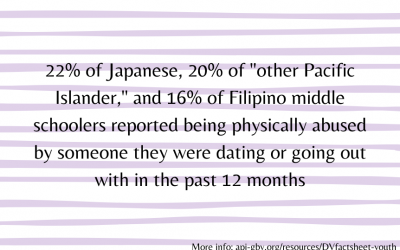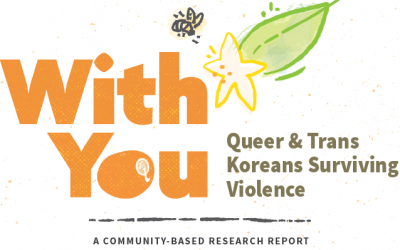AANHPI communities tend to be collective in nature, as well as hierarchical, to varying degrees. Both contexts complicate the concepts of consent and boundaries, especially for AANHPI youth and young adults, who often do not have opportunities to learn about the taboo topics of sex and relationships with trusted adults. This report explores how consent and boundaries are understood and practiced in AANHPI contexts, highlights how gender expectations and the need to respect certain individuals make it hard to establish boundaries, and presents recommendations for advocates and educators.
Related Resources
Connected and concerned: Online sexual harassment of teenagers of Asian descent on dating platforms
February 29, 8am HST/11am PST/1pm CST/2pm ESTGenerative AI, with its ability to create morphed photos and deepfakes, is negatively impacting teenagers, especially female teenagers of Asian descent, online and influencing their identity in digital spaces. This...
Centering AANHPI Survivors: Recommendations for Campus and Title IX Administrators
This summary report lifts up the experiences and needs of Asian, Asian American, Native Hawaiian, and Pacific Islander students and staff who face dating and domestic violence, sexual assault, or sexual harassment on campus. While focused on experiences of survivors on college campuses, the findings and recommendations may also have implications for AANHPI students in the context of K-12 schools. Many thanks to the AANHPI survivors and advocates who were willing to share their experiences and insists with API-GBV!
Webinar for Advocates and Adult Allies! Sexual Harassment & AAPI Teens
Do you know what signs to look for and what steps to take if a teen or young adult encounters sexual or other harassment in the workplace? At the EEOC, we have seen that young workers at their first jobs can be especially vulnerable to harassment whether due to sex, national origin and other characteristics. Make a difference in the lives of the Asian and Pacific Islander teens and young adults you serve by learning how to recognize and refer cases, and understanding the role you can play to address workplace sexual harassment.
Presented by EEOC San Francisco. Hosted by API-GBV.
Factsheet: Dating/Hookup Abuse and Campus Sexual Assault among Asian and Pacific Islander Youth
A collection of information and statistics on dating abuse and sexual assault affecting API teens and youth
With You: Queer and Trans Koreans Surviving Violence: A Community-Based Research Report, 2018
By the Korean American Coalition to End Domestic Abuse
This report is an effort to document and reflect on the experiences of queer and trans Korean survivors of family or intimate partner violence. It shares key findings of the Queer & Transgender Korean American Survey on Family and Intimate Partner Violence in Our Community, as well as two in-person focus groups.
How To Make Sure Immigrant Women Aren’t Left Out of Me Too
We need policies that ensure that all workers, whether they are employees or contractors, have access to safety and justice in the workplace.
Sexual Violence in Asian and Pacific Islander Communities, 2018
Research and data on sexual abuse in Asia and in the U.S, community-specific abuse, child sex abuse, sexual abuse among young adults, and help-seeking & services.
Domestic Violence and Sexual Assault in the Pacific Islander Community, 2017
Erin Thomas, Asian/Pacific Islander Domestic Violence Resource Project (DVRP)
An overview of the geographical, historical, ethno-linguistic, and cultural diversity of Pacific Islander communities; historical trauma; and GBV trends.
Krista Grajo, MA and Shirley Luo
April 2023






